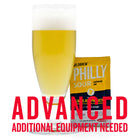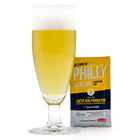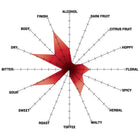Product Details
Philly Weisse - Sour Beer Recipe Kit
Philly Weisse is a modern interpretation of a historic beer style utilizing traditional grains and hops, but departs from convention with the help of a novel yeast strain. Classical Berliner Weisse beers are low in alcohol, light in color, soured with lactic acid producing bacteria and serve as the basis for this recipe. While Philly Weisse has its roots entwined in German brewing tradition, a newly isolated yeast strain, Wildbrew™ Philly Sour, provides the signature tart character without the need to utilize lactobacillus. Equal proportions of wheat and pilsner malt create a soft, delicate malt character with notes of fresh bread and moderate cracker, while a pinch of hops adds a subtle herbal and floral aroma. Wildbrew Philly Sour ties it all together, lending an elegant tart acidity to create a dry, crisp and extremely refreshing beer.
Philly Weisse Brewing Notes:
- Style: Berliner Weisse
- Fermentation Range: 68-77°F
- Original Gravity: 1.036
- SRM: 3
- IBU: 4
- ABV: 3.9%
Philly Weisse Tasting Notes:
- Aroma: Low grainy malt character with notes of bread and cracker. Faint herbal and floral hop aroma. Acidic sour overtones.
- Appearance: Light straw color with low to medium haze. Tight, bright white foam head.
- Flavor: Medium malt sweetness with flavors of bread and flaky cracker. Medium low fruity esters and low floral and spicy hop flavor characteristics. Medium to medium-high sour tartness.
- Mouthfeel: Light body with low creaminess and a lingering tingling palate sensation from the sourness.
Looking for the Extract Version?
Additional Information
| SKU | B12063 - Unmilled |
| Beer Color | Light |
| Original Gravity | 1.036 |
| Total Time to Make | 6 weeks |
| Regional Style | German/Czech/Continental |
| Alcohol Content | Low |
| Yield | 5 Gallons |
| Beer Style | Berliner Weisse |
| Fermentation Type | Ale |
| Beer Recipe Kit Instructions |
|
Notes from Brad, Northern Brewer Head Brewer:
“The release of WildBrew Philly Sour has really opened up the world of sour beers and it was high time to make a recipe kit featuring this novel new yeast strain. Out of all the styles that this yeast can emulate, I figured Berliner Weisse would be a great candidate because of its simplicity, ease of brewing and just how damn refreshing a good Berliner Weisse is. The base recipe is really nothing special, just equal parts pilsner and wheat malts and a small dash of Hallertau to give it a little herbal and floral pop. It’s the Philly Sour that really makes this recipe shine, and this yeast is incredibly easy to work with and comes with the benefit of not having to use traditional lactobacillus in your brewery and risk contaminating other batches in the process. WildBrew Philly Sour is an awesome new yeast strain that was isolated in Philadelphia (hence the name) by the University of the Sciences and has the unique capability to produce lactic acid and alcohol in the same fermentation step. This uncanny ability allows brewers to produce a wide range of soured beers in an incredibly simple manner.
There are a few things to keep in mind when using this strain to ensure the most positive outcome: First, Philly Sour enjoys a relatively high fermentation temperature. Elevated temperatures reaching into the upper 70’s is the goal to make sure that the yeast will produce as much lactic acid as possible to provide the sour note to the beer. Second, lactic acid production is a function on how much glucose is available during fermentation. For the first 1 to 3 days of fermentation, this unique yeast strain will convert glucose-based sugars (ie dextrose, aka corn sugar) into lactic acid before it goes on to produce ethanol from the heavier sugars (maltose, maltotriose, etc.). For this reason, the Philly Weisse recipe includes 5 oz of corn sugar added at the end of the boil. Its sole function is to aid Philly Sour in producing lactic acid. Finally, Philly Sour is a poor candidate for bottle conditioning to create carbonation. Due to its affinity to produce lactic acid from the simple sugars combined with its high flocculation make it undesirable for bottle conditioning. If you are bottling your beers and relying on natural carbonation, we have provided an option to add a packet of LalBrew CBC-1 Cask and Bottle Conditioning Ale Yeast to add along with the normal priming sugar get the job done. If you keg your beers and use a CO2 cylinder to force carbonation into your beers, adding a separate yeast strain is unnecessary.”






